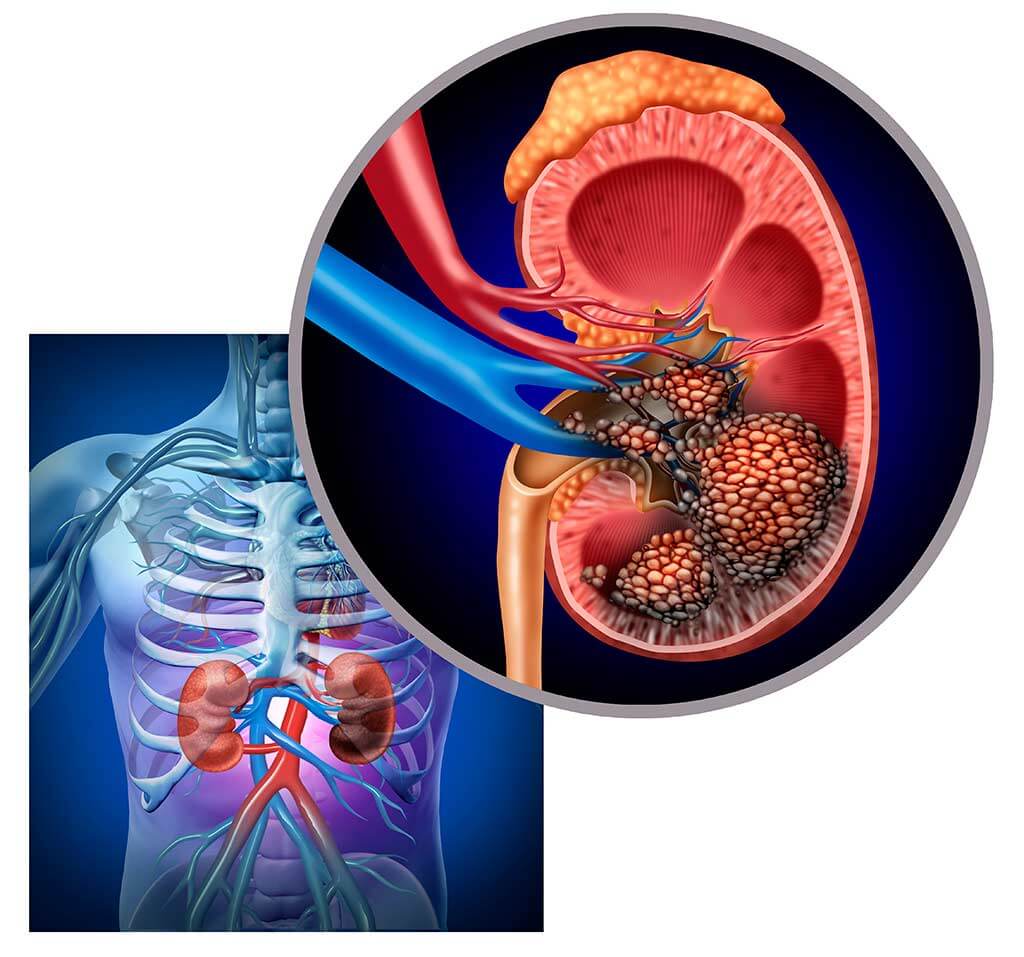If you need information about new effective treatments for stage 4 cancer, you can find it
According to the World Cancer Research Fund, kidney cancer was ranked 9th among the most common oncological pathologies in the world in 2018. Most tumors develop from the renal tubules, which actively filter up to 2000 liters of blood per day. As a result, kidney cancer is mostly diagnosed at an early stage, before metastasizing. Kidney cancer treatment includes surgical tumor removal, biological therapy, and maintenance of the remaining kidney function.
Content
- Symptoms of different kidney cancer stages
- Diagnostics, ranging from simple lab tests to biopsies
- Treatment methods and individual rehabilitation
- Selection of a clinic without any geographical restrictions, with Booking Health
Symptoms of different kidney cancer stages
Most patients do not have any manifestations at the initial stages of cancer. As the neoplasm grows, renal (related to the kidneys directly) and extrarenal (not related to the kidneys directly) symptoms develop.
Renal symptoms include:
- acute pain with localization in the hypochondrium or lumbar region;
- pain that is resistant to painkillers;
- appearance of blood in the urine that is visible to the naked eye;
- detection of a palpable neoplasm in the hypochondrium.
Extrarenal manifestations of the disease include:
- swelling of the lower extremities and deep vein thrombosis;
- dilation of the saphenous veins of the anterior abdominal wall;
- severe anemia (hemoglobin levels are less than 70-80 g/L);
- weight loss, up to cachexia;
- fever, persistent low grade fever;
- persistent and resistant to antihypertensive drugs arterial hypertension.
At its advanced stages, the tumor can cause bone pain, coughing up blood, or spinal cord disorders. However, these symptoms, as well as extrarenal manifestations of the disease, are not strictly specific to oncology.
Diagnostics, ranging from simple lab tests to biopsies
An objective examination consists of laboratory tests, imaging studies, and a biopsy with a histological and immunohistochemical examination of the removed tissue sample.
Laboratory diagnostics of kidney cancer include:
- complete blood count with an assessment of the hemoglobin levels (patients often have anemia), white blood cells, and ESR;
- urinalysis serves to identify single red blood cells or macrohematuria;
- biochemical blood test with an assessment of the kidney and liver function and protein and blood glucose levels;
- Coagulogram involves the assessment of the blood coagulation system, which is especially important at the planning stage of the operation (patients may be prone to spontaneous bleeding).
Instrumental diagnostic methods allow oncologists to evaluate the size and location of the tumor, as well as the degree of its invasion into the surrounding tissue:
- An ultrasound is helpful in distinguishing between cystic formations and solid tumors, determining the approximate volume of the neoplasm and the type of its growth, including if it’s spread to healthy tissues.
- A CT scan of the abdominal cavity and retroperitoneal space is considered the most informative imaging technique and gives the doctor information about the condition of the kidneys, adrenal glands, liver, and portal vein, as well as the lymph nodes.
- An MRI of the abdominal cavity and retroperitoneal space is used as an additional technique and is informative in assessing the spread of the malignant process.
- A renal arteriography is a contrast radiography that allows doctors to selectively assess the condition of the renal blood vessels, including the arteries that feed the tumor.
- A skeletal scintigraphy can be prescribed in cases of the suspected development of bone metastases.
A biopsy is considered the "gold standard" of diagnostics. A biopsy is a sampling of kidney tissue in an operating room. Formally, with available convincing data from the imaging studies, the doctors could make a diagnosis without histological confirmation. Nevertheless, the leading cancer clinics always prefer performing a needle or open biopsy, because its results allow for the accurate determination of the tumor type and planning the optimal kidney cancer treatment.
Treatment methods and individual rehabilitation
A multidisciplinary medical team, consisting of a urologist, an oncologist, and a surgeon, deals with the treatment of kidney cancer. In most cases, the first stage of a comprehensive therapeutic regimen involves a surgical procedure:
- Partial laparoscopic nephrectomy can be performed in patients with tumors less than 4 cm in size, especially in the presence of concomitant impaired kidney function, when the total removal of the affected organ will lead to severe kidney failure. Tumor resection is performed within healthy tissues. This means that there should be no cancer cells at the edges of the surgical wound, which can be confirmed by an intraoperative examination of the tumor bed under a microscope.
- Simple nephrectomy involves total removal of the affected organ.
- Simple or laparoscopic nephrectomy with ureterectomy is an extensive operation, which serves to remove the organ itself, adrenal gland, part of the ureter, perirenal adipose tissue, and regional lymph nodes.
Alternatives to classical surgery are cryotherapy (cryoablation), radiofrequency ablation, and tumor embolization. Chemotherapy and radiation therapy are not considered as first-line methods for nephrological oncopathologies.
The next most effective method is biological therapy, which includes targeted action on the tumor cells and restoration of the patient's antitumor immunity. In particular, in cases with metastatic renal cell carcinoma, interferon alpha and interleukin-2 preparations can be used. Both substances are involved in the implementation of non-specific antitumor immune responses. Angiogenesis blockers, tyrosine kinase, and mTOR inhibitors are prescribed as targeted agents.
Due to the inevitable damage to the kidneys during an active treatment, patients can often develop kidney failure. Before discharge from the hospital, doctors give detailed recommendations on nutrition (a specific diet helps normalize kidney function and reduces the need for hemodialysis), physical activity, and medication intake. In the most complex situations, a donor kidney transplant can be performed.
Selection of a clinic without any geographical restrictions, with Booking Health
The specialized European clinics and hospitals in Turkey consistently demonstrate the highest success rates in the treatment of kidney malignancies. Thanks to Booking Health, when patients are choosing a medical facility, they can give priority to the quality of medical services they’ll receive, without considering any geographical limitations.
The following hospitals demonstrate the highest success rates in the treatment of kidney cancer:
- University Hospital of Ludwig Maximilian of University of Munich, Department of Adult and Pediatric Urology
- University Hospital Ulm, Department of Adult and Pediatric Urology
- Urology Hospital Munich-Planegg Munich, Department of Adult and Pediatric Urology
- Charite University Hospital Berlin, Department of Adult and Pediatric Urology
- University Hospital Frankfurt-am-Main, Department of Urology
Booking Health specialists will help you with the following important issues:
- selection of the right hospital, based on an annual qualification profile;
- direct communication with your attending physician (urologist or oncologist);
- preparation of a preliminary treatment program, without repeating previous examinations;
- provision of a favorable cost of clinic services, without additional coefficients for foreigners (saving up to 50%);
- making an appointment for consultation or hospitalization on your desired date;
- monitoring of diagnostics and treatment at all stages;
- assistance in buying and forwarding medicines;
- communication with the clinic after discharge;
- control of invoices, return of unspent funds;
- organization of follow-up examinations and rehabilitation;
- top-class service: booking hotels, airline tickets, and transfers.
Choose treatment abroad and you will for sure get the best results!
See the interview for more information:
INNOVATIVE TYPES OF RADIATION THERAPY FOR CANCER – interview with Dr. med. Peter Stoll
Authors:
The article was edited by medical experts, board certified doctors Dr. Vadim Zhiliuk, Dr. Nadezhda Ivanisova. For the treatment of the conditions referred to in the article, you must consult a doctor; the information in the article is not intended for self-medication!
Sources:
Read:
Why Booking Health - questions and answers
How to make right decision when choosing the clinic and specialist
7 reasons to trust to the rating of clinics on the Booking Health portal
Don't know where to start?
Contact Booking Health







